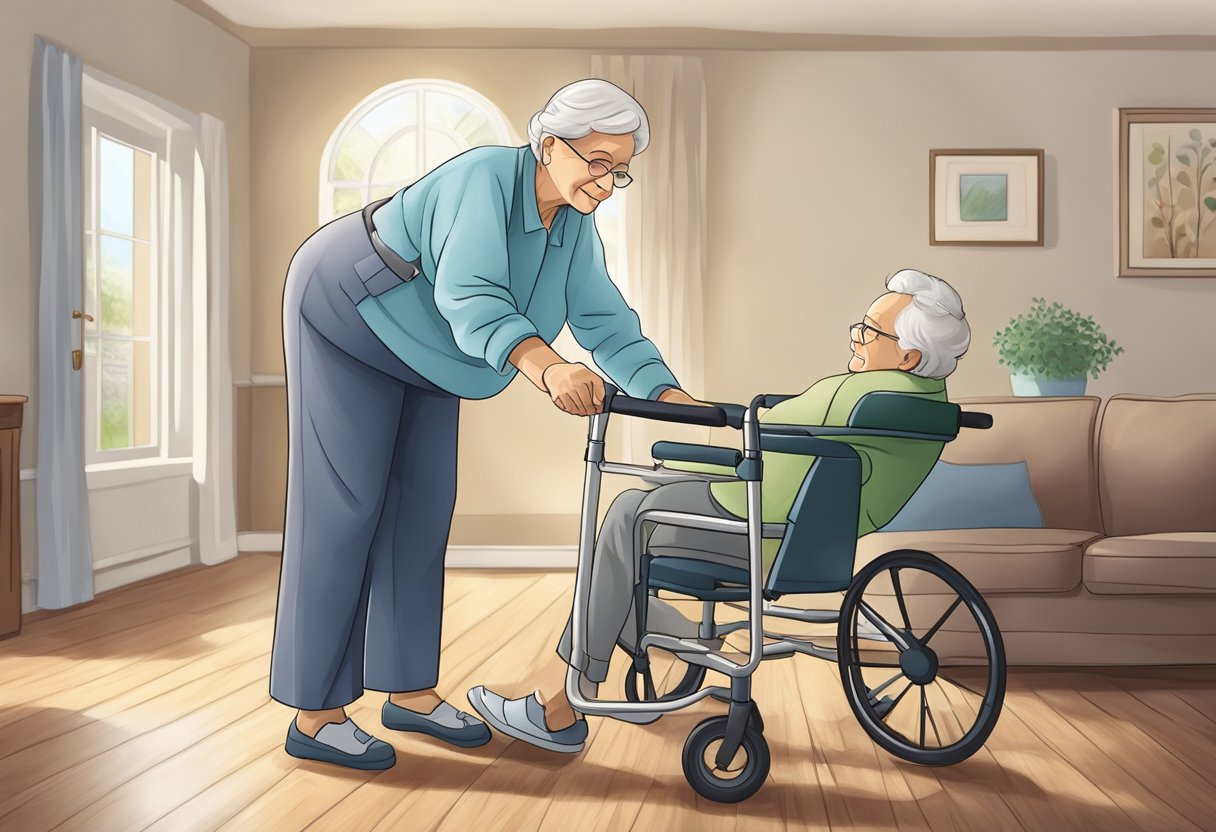Understanding the concept of independence in seniors is vital, as it enables them to retain their sense of identity and purpose. However, it’s also crucial to recognize that certain situations might require external support, such as limited mobility, cognitive decline, or other age-related factors. Striking the right balance between maintaining independence and seeking needed help can lead to a healthier, happier, and more fulfilling life for seniors.
Key Takeaways
- Balancing independence and seeking help is crucial for seniors’ well-being.
- Recognizing when support is needed can enhance seniors’ quality of life.
- Finding the right balance involves healthy aging practices, social activities, and exploring support options.
Seeking Help as a Senior: The Reality of Aging
As you grow older, the reality of aging becomes more apparent. Your abilities to perform certain tasks may change, and some challenges may arise. But remember, this is a natural part of life, and being aware of these changes can help you maintain your independence and adapt more efficiently.
One of the most common issues older adults face is the decline in their physical abilities. You may find it harder to maintain balance, and your muscle strength might decrease, making it difficult to perform daily activities. Research shows that better balance is crucial in preventing falls and maintaining independence as you age.
Another aspect of aging is the need for help-seeking behaviors. As an older adult, you might face challenges requesting assistance when dealing with physical or mental health issues. It’s crucial to seek help appropriately to maintain your well-being and ensure you’re receiving the right care.
Here are a few tips to help you cope with aging:
- Regular exercise: Engage in physical activities that help maintain muscle strength and mobility.
- Stay socially active: Participate in conversations and connect with friends and loved ones to keep your mind sharp.
- Acknowledge the need for assistance: Recognize when you need help and seek it from professionals, caregivers, or family members.
It’s essential to engage in positive aging techniques that support your well-being and help you foster resilience throughout the aging process. Adopting a proactive approach towards your health and utilizing available resources can guide you through the balancing act of aging while preserving your independence.
Remember, aging is a journey, and understanding your changing abilities will play a significant role in ensuring a better quality of life. As you navigate through these changes, embrace the knowledge acquired over the years and take the steps necessary to adapt, grow, and enjoy your golden years.
Understanding Independence and Autonomy in Seniors
As you navigate the journey of aging, maintaining a sense of independence and autonomy is essential for your overall well-being. In this section, we will explore the importance of striking a balance between independence, control, and seeking help when needed.
Independence refers to an individual’s ability to perform daily tasks and make decisions without relying on others. For seniors, this means being capable of managing personal care, household chores, and making decisions about finances or healthcare. Emphasizing independence in seniors can provide them with a sense of self-sufficiency, boosting self-esteem and contributing to an improved quality of life.
Autonomy, on the other hand, revolves around the freedom to make choices that align with one’s values and identity. For older adults, autonomy is critical to maintain a sense of control over their environment and daily routines. Research indicates that perceived autonomy promotes both health and quality of life in seniors living in residential care.
Some aspects of achieving autonomy among seniors include:
- Decision-making: Allowing seniors to make informed choices about personal matters, such as healthcare or daily routines.
- Self-sufficiency: Encouraging seniors to engage in activities that promote a sense of independence and competence in daily living.
- Identity: Supporting seniors to continue expressing their unique personalities and preferences throughout their golden years.
To strike a balance between independence and seeking help, it is crucial to communicate openly and honestly with family members, friends, or caregivers. By establishing a strong support system, seniors can maintain both independence and control over their lives while receiving necessary assistance when required.
In summary, both independence and autonomy play vital roles in the emotional and physical well-being of older adults. By understanding their importance and leveraging support networks when required, seniors can continue to live fulfilling and meaningful lives.
Importance of Balancing Independence and Help
As a senior, you may face various challenges in your daily life. It’s essential to strike a balance between maintaining your independence and seeking help when necessary, as this can significantly impact your quality of life. Fostering a sense of independence is crucial to your mental and emotional well-being, providing you with a sense of control and purpose1. However, it’s also essential not to hesitate in seeking help when required, as support systems are critical in maintaining an optimal lifestyle.
First, let us discuss the importance of independence. Being able to perform your daily tasks independently not only boosts your confidence but also contributes to maintaining cognitive health2. Daily routines that promote both memory and independence further enhance your overall well-being. Make sure to engage in activities that challenge you mentally and physically, as this helps in preserving an active mind.
Now let’s consider the need for seeking help. While striving for independence is essential, there may be times when additional support is required. This can range from assistance in performing daily tasks such as cooking and cleaning to seeking professional help for mental health concerns3. Remember that it’s never a sign of weakness to ask for help; in fact, it’s a way of empowering yourself to have the best life possible.
In conclusion, balancing your independence and seeking help when necessary is a vital aspect of being a senior. By doing so, you not only ensure a better quality of life but also create an environment where both you and your support systems can work together effectively.
Recognizing the Need for Help
As a senior, maintaining independence is important, but it’s equally crucial to recognize when to seek help. It’s essential to balance your desire for independence with ensuring your safety and well-being. Here are some signs that may indicate it’s time to seek help.
Physical Abilities: When you notice a decline in your physical abilities, such as difficulty dressing, climbing stairs, or maintaining balance, it’s crucial to consider asking for help. This could mean getting assistance with daily tasks or looking into mobility aids to enhance your independence.
Cognitive Abilities: Changes in your cognitive abilities can impact your daily life significantly. If you experience memory lapses, confusion, or trouble making decisions, it’s important to seek help from a healthcare professional who can assess your cognitive health and recommend appropriate interventions.
Social Isolation and Interactions: Feeling isolated or withdrawing from social interactions can negatively impact your mental well-being. Reach out to friends, family, or local community groups to stay connected and help maintain a support network. If isolation is due to loss of mobility or cognitive decline, consider seeking assistance to address these issues.
Meal Preparation and Personal Care: Struggling with meal preparation, personal care, or keeping up with household tasks is a clear indication that it’s time to ask for help. Assistance with daily activities can significantly improve your quality of life.
In conclusion, pay close attention to your physical abilities, cognitive health, social interactions, and ability to perform everyday tasks. Recognizing the need for help is vital in maintaining a balanced and fulfilling life for seniors.
Healthy Aging Practices

As you age, it’s important to focus on healthy practices that promote physical, emotional, and mental well-being. Taking care of your overall health is crucial for maintaining independence and quality of life. Here are some essential aspects to consider.
Exercise is a cornerstone of healthy aging. Staying physically active not only helps maintain your strength, balance, and flexibility but also supports mental and cognitive health. Incorporate both aerobic exercises, such as walking or swimming, and strength training exercises to build muscle mass and improve balance. Consider activities like yoga or tai chi to enhance flexibility and relaxation.
Engaging in hobbies can significantly contribute to your emotional and mental well-being. Pursuing activities you enjoy, such as gardening, painting, or crafting, can bring a sense of accomplishment while also reducing stress and anxiety. These activities can also foster social connections if you join clubs or classes with like-minded individuals.
Mental health plays a vital role in healthy aging. Stay mentally active by engaging in cognitive tasks like puzzles, reading, or learning new skills. Such activities can help maintain memory function and reduce the risk of cognitive decline. Additionally, include mindfulness or meditation practices to reduce stress and improve overall mental health.
Your emotional well-being is equally important during your senior years. Cultivate strong social networks and nurture supportive relationships with friends, family, and community members. Engaging in social activities, joining support groups, or volunteering offers opportunities to connect with others, improving emotional resilience and well-being.
Finally, maintaining physical exercise is crucial to healthy aging. Keeping in mind your abilities and limitations, create a manageable routine that targets strength, balance, and flexibility. Consider working with a specialized trainer or consulting with your physician to develop a safe and effective exercise program tailored to your needs.
By combining these healthy aging practices, you can enhance your independence and overall well-being during your senior years. Remember to regularly assess your needs, seek help when needed, and engage in activities that promote physical, mental, and emotional health.
Impact of Social Activities on Senior Living
As you age, balancing independence and seeking help can be challenging. One critical aspect of senior living is maintaining an active social life, which can positively impact your well-being. Engaging in social activities can significantly improve your emotional health and overall quality of life. In this section, we’ll discuss the importance of social activities in senior living and how they can impact various aspects of your life.
Researchers have found that physical activity can lead to increased independence, higher self-esteem, and better life quality for seniors. Participating in social activities allows you to improve your physical health, maintain balance, and enhance movement. Regular physical activity can also delay elderly dependence, giving you more autonomy over your daily life.
By actively participating in a community, you can foster companionship and reduce feelings of loneliness and isolation. It is crucial to maintain open communication and create meaningful relationships with your peers in senior living communities. Researchers have shown that social connections can lead to improved mood and a decreased risk of experiencing negative emotions. Forming bonds with others also cultivates a sense of belonging and helps in developing a strong social identity.
Here are some examples of social activities that can have a positive impact on your life as a senior:
- Group exercises: Participating in group exercises promotes physical health and helps in building connections with community members.
- Art classes: Engaging in artistic pursuits encourages creativity and self-expression while allowing you to interact with like-minded individuals.
- Discussion groups: Joining discussion groups on various topics can sharpen your critical thinking skills and enhance your communication abilities.
- Community volunteering: Giving back to your community instills a sense of purpose and duty, fostering social connections and personal growth.
As a senior, it is crucial to remember that seeking help does not necessarily undermine your independence. On the contrary, accepting assistance when needed can lead to a more fulfilling and balanced life. Engaging in social activities with your fellow seniors can greatly contribute to your mental and physical well-being while helping you maintain a healthy level of autonomy. So, don’t hesitate to dive into various recreational activities and explore opportunities to connect with others to enhance your senior living experience.
Strategies for Retaining Independence

As you age, retaining your independence becomes increasingly important for your sense of control and autonomy. Developing strategies to maintain independence can help you continue to live a fulfilling life. Here are some suggestions for preserving your independence as a senior:
1. Embrace decision-making: Be actively involved in the decisions that affect your life. This includes health care, financial planning, and daily routines. By taking charge of your choices, you’ll maintain a sense of purpose and self-esteem.
2. Modifications and tools: Don’t hesitate to make necessary modifications in your environment. Implementing assistive devices and making simple changes within your home can promote your safety and make it easier for you to perform daily tasks independently. These modifications can include grab bars, non-slip mats, or increased lighting.
3. Empower yourself through knowledge: Learn about the resources available to you as a senior. Being well-informed allows you to tap into programs and services that can support your independence and quality of life. For example, investigate transportation services and home-based care providers in your community.
4. Foster social connections: Engage in social activities and maintain relationships with friends and family. Not only does a strong social network enhance your emotional well-being, but it also provides a support system when needed.
5. Maintain a healthy lifestyle: Prioritize your physical and mental health. A healthy lifestyle helps you retain energy and vitality, enabling you to continue performing daily tasks with ease. Stay active through exercise, eat a balanced diet, and ensure adequate sleep.
By implementing these strategies, you can continue to preserve your independence and enjoy a rich, autonomous life. Be proactive, stay connected, and remain involved in the decision-making process as you navigate through your senior years.
Providing Support as a Family Member

As a family member, it is crucial to understand the importance of providing support to seniors while maintaining their independence. One way to achieve this balance is to be attentive to their emotional needs. Emotional support enhances seniors’ mental well-being, which comprises listening and offering guidance.
Effective communication plays a vital role in understanding your senior’s concerns, feelings, and desires. Make an effort to actively listen to them, ask open-ended questions, and allow seniors to express their thoughts freely. Maintaining consistent and open communication lines will help build trust and keep their dignity intact.
Another essential aspect is identifying signs of depression and taking appropriate measures. Encourage your senior family member to engage in social activities and hobbies to foster a sense of belonging and purpose. If necessary, don’t hesitate to seek professional help for mental health issues.
In addition to emotional support, caregivers play a significant role in assisting seniors. As a caregiver, it’s essential to prioritize the senior’s preferences and values, assuring the caregiving roles are tailored to their unique needs—considering factors like personal care, home modifications, and assistance with daily tasks.
Remember, caregiving is an ever-evolving process. Stay flexible and attentive to changes in your senior’s needs and preferences. Provide support while encouraging their independence, allowing them to feel in control of their lives.
Lastly, always show appreciation and respect towards the senior. Acknowledge their life experiences, wisdom, and resilience. In doing so, you contribute to their sense of dignity and validation, reinforcing a positive caregiving environment.
Exploring Support Options for Seniors

As you navigate the complexities of aging, it is essential to understand the various support options available for seniors. These options can help maintain a balance between independence and receiving necessary assistance.
Home Care Services offer personalized support tailored to your individual needs. These services can include light housekeeping, meal preparation, medication reminders, and companionship. By opting for in-home care, you can maintain your independence while receiving the assistance you need.
Eldercare encompasses a wide range of services including personal care, nursing care, and specialized therapies. Senior care providers work to ensure that your emotional, social, and physical needs are met while promoting your autonomy.
Assisted Living communities are designed for seniors who require minimal assistance with daily activities. These communities often provide a variety of amenities such as dining services, housekeeping, and transportation. Living in an assisted living facility allows you to maintain your independence while having access to support when needed.
Nursing Homes are best suited for seniors who require more comprehensive care. These facilities provide round-the-clock supervision and specialized treatments. Choosing a nursing home ensures that your medical and personal needs are fully addressed, while still providing opportunities for socialization and engagement.
There are various Programs and Services targeted at helping seniors in different aspects of life. Some examples include:
- Meal delivery services
- Transportation assistance
- Support groups and counseling
Take the time to research and understand your support options, as this can help you make well-informed decisions about your care and maintain a sense of independence throughout your senior years.
Safety Considerations for Seniors Living Independently
As you embark on the journey to live independently, it is essential to prioritize safety and remain aware of potential hazards. There are several safety considerations for seniors living independently, including home safety measures, medical alert systems, and medication management.
One of the primary concerns for seniors living independently is ensuring that your living space is secure and accident-free. To maintain a safe environment at home, adhere to some basic home safety guidelines:
- Install smoke detectors and replace the batteries twice a year.
- Ensure heaters are at least 3 feet away from flammable materials like curtains, bedding, or furniture.
- Remove trip hazards like loose rugs, electrical cords, and cluttered walkways.
It is also essential to have a reliable medical alert system in place. These devices allow you to call for immediate assistance in case of a fall or medical emergency. With a wide range of options available, choose a medical alert system that best suits your needs and preferences, such as wearable pendants or in-home monitoring systems.
Medication management is another crucial aspect of independent living. As a senior, improper handling or administration of medication can lead to serious safety risks. To ensure correct medication usage:
- Keep a detailed, up-to-date list of all medications, including dosages and scheduling information.
- Use pill organizers to keep track of daily medication intake.
- Consult with your healthcare provider or pharmacist about potential drug interactions and side effects.
Finally, acknowledge that seeking help and accepting contributions from others is not a sign of weakness; rather, it demonstrates wisdom and a proactive approach to your well-being. Engage with your family, friends, and support network to assist with tasks that might be challenging or risk-prone. Regular communication and involvement can go a long way in maintaining your independence while prioritizing safety.
Embracing these safety considerations will help you enjoy your independence while minimizing potential risks. By being proactive and vigilant in addressing concerns, you can lead a fulfilling and safe life as a senior living independently.
Adapting to Aging and Embracing Change
As you age, it’s essential to accept and adapt to the changes your body and mind undergo. Developing adaptability can help you maintain your independence, health, and quality of life. This trait will empower you to create new solutions to problems that may arise during the aging process.
One of the most critical aspects of aging gracefully is knowing when to seek help and how to balance it with your independence. Admitting you need assistance doesn’t signify weakness; in fact, it shows your strength for recognizing areas where you need support.
Adapting to these changes often involves making modifications to various aspects of your life, such as:
- Home: Ensure your living space is safe and accessible, with modifications like grab bars, ramps, and adequate lighting.
- Health care: Regularly visit your healthcare professionals and communicate any concerns regarding cognitive changes that could indicate Alzheimer’s or other age-related conditions.
- Social connections: Stay engaged with friends, family, and your community to maintain strong support networks that contribute to your well-being.
In addition to these modifications, it’s essential to continue pursuing personal interests and activities that bring you joy. Regularly engaging in hobbies, attending social events, or picking up new interests can keep you connected and provide a sense of accomplishment.
Remember that your health care team is an invaluable resource to help you navigate the complexities of aging. They can provide support and guidance on adapting to new situations and finding practical solutions to challenges you may face.
By practicing adaptability and understanding when to seek help, you can experience a fulfilling and enjoyable life as you age. Keep in mind that it’s never too late to learn new skills or set new goals for yourself — embrace change and continue to grow.
Age-specific Programs and Services
As a senior, you have access to a variety of age-specific programs and services designed to help you maintain your independence while also providing necessary assistance. These resources are tailored to address the unique challenges you may face in various aspects of life, such as healthcare, transportation, and nutrition.
The National Council on Aging offers a comprehensive list of benefits and programs for older adults, including wellness programs, nutritional support, and educational resources about health and aging. They also provide information on financial assistance, housing options, and home safety to help you navigate the challenges of living on a fixed income.
Healthcare is a significant concern for many seniors, and the National Institute on Aging provides valuable information on various age-related topics, from staying healthy to managing chronic conditions. They also offer resources and guidance on choosing the right healthcare providers and facilities.
Transportation can be a barrier to accessing essential services and staying socially connected. Many communities have senior-specific transportation options, which can be found through local senior centers or national resources provided by the U.S. Department of Health and Human Services. These modes of transportation help ensure you can attend medical appointments, shop for groceries, and participate in social activities.
Here’s a brief summary of the types of programs and services you can access:
- Healthcare:
- Age-specific healthcare resources
- Guidance on selecting providers and facilities
- Transportation:
- Senior-specific transportation options
- Access to medical appointments, shopping, and social activities
- Nutrition and wellness:
- Nutritional support and meal programs
- Wellness activities and exercise classes
Remember, seeking help and utilizing available resources does not compromise your independence. Instead, these programs and services are designed to support you in achieving a well-balanced and fulfilling life as a senior.
Frequently Asked Questions
How can seniors maintain their independence while also seeking assistance?
To maintain independence while seeking help, seniors can establish clear communication with caregivers and emphasize their preferences and needs. Encouraging seniors to participate in hobbies and social activities can also help them maintain a sense of autonomy while receiving assistance.
What are the benefits of elderly individuals maintaining their individuality in care settings?
Maintaining independence in care settings can contribute to seniors’ self-esteem and overall well-being. A sense of autonomy can help avoid feelings of isolation and depression and enhance their quality of life by allowing them to maintain control over personal decisions.
What strategies can caregivers use to promote seniors’ autonomy?
Caregivers can support seniors’ independence by offering choices, respecting personal preferences, and involving seniors in decision-making processes. Encouraging hobbies, social activities, and personal interests can also foster a sense of autonomy.
How do seniors balance independence and relying on others?
Seniors can balance independence and relying on others by openly communicating their needs and working with caregivers to establish a tailored support plan. By focusing on maintaining personal interests, engaging in meaningful activities, and utilizing available resources, seniors can strike a balance between self-sufficiency and receiving necessary assistance.
What factors should be considered when seeking help for seniors?
When seeking help for seniors, consider their unique needs, preferences, and personal circumstances. Evaluate their physical and cognitive abilities, personal interests, and their desire for social interaction. It’s essential to involve seniors in the decision-making process and choose care options that align with their values and goals.
When is the right time for seniors to seek assistance while maintaining autonomy?
The right time to seek assistance while maintaining autonomy will vary between individuals. Look for changes in seniors’ health, mobility, and cognitive function as indicators that they may require support. Seeking assistance early allows seniors to maintain their independence longer and adapt to care options that best suit their needs.






